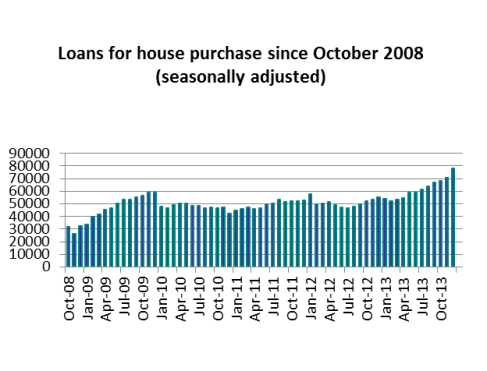Economics
- House prices are likely to continue rising for at least another ten years, George Osborne suggested yesterday when he attacked “Nimbys” for slowing down planning reforms – reported on the front page of The Times by Sam Coates, Philip Aldrick and Francis Elliott. The Chancellor told peers that the shortage of housing was an historic problem as he stressed that the coalition was trying to boost supply as well as providing cheaper home loans to struggling families. “I imagine if we were to assemble again in ten years’ time, we would still be talking about the challenge of making sure that our housing supply keeps up with demand,” he told the House of Lords Economics Affairs Committee. Mr Osborne defended the Help to Buy policy in the face of criticism from Liberal Democrats such as Vince Cable, who suggested last week reducing the maximum home purchase of £600,000.
Personal Finance
- While The Sun’s leader is dedicated to energy prices, the Daily Mail looks at miss-selling of superfluous insurance against credit card fraud along with a brief history of miss-selling scandals – from pensions mis-selling scandal, endowment mortgages, and Payment Protection Insurance to interest-rate swap loans and packaged bank accounts. Some 7 million customers of banks such as Barclays, Santander and RBS have been conned into paying up to £1.3billion for policies they don’t need – Lloyds is now implicated as well. The Mail says “though the products mis-sold may have varied, one mystery endures. Why, after this long history of deception and grand larceny, has not a single senior banker been hauled before the courts?…. This fraud won’t cease until the guilty are behind bars.”
Property
- Prince Charles has waded into the battle for residents of Somerset according to the front page of The Times, The Guardian and the Daily Mail. The Mirror and the Daily Telegraph are unlikely bedfellows but not only do they also put Charles’ criticism of the official response to the crisis on the front page – they also run editorials on it. Although it was not overtly political, the Daily Telegraph compared the Prince’s visit (he was greeted warmly) to that of Owen Paterson, the Environment Secretary, who was met with placards and jeers. The Telegraph says the visit “reminded us in what low regard quangocrats – such as the mysteriously absent Chris Smith, who runs the Environment Agency – are held.” The Mirror’s Leader piece, on the other hand says the Prince of Wales criticising the disastrously slow response… “is a royal seal of disapproval on David Cameron’s Government”.
Recruitment
- The Daily Express says “Britain’s overstretched public services are nearing breaking point” blaming immigration. “One in four babies born in this country have a mother who comes from outside the UK, while Afghan and Somali women are having four or more children, more than twice the national average. They will… need medical care before, during and after the birth… and that’s before the needs of schooling and housing even enter the equation…. This simply has got to stop. The Prime Minister has talked grandiosely about bringing net migration figures into the tens of thousands (and even that would be too much in this overcrowded little isle) and yet it has been revealed that net migration from the EU rose to 106,000 in the year ending June 2013, up from 72,000 the previous year. And that was before immigration controls on people arriving from Eastern Europe were lifted in January. Labour’s stance on immigration was one of the wickedest policies it pursued in its 13 years of office, a course of action foisted on the electorate for utterly cynical reasons which has changed the face of this country for ever.” The Express concludes, “Mr Cameron must act to stem further damage. And fast.”





